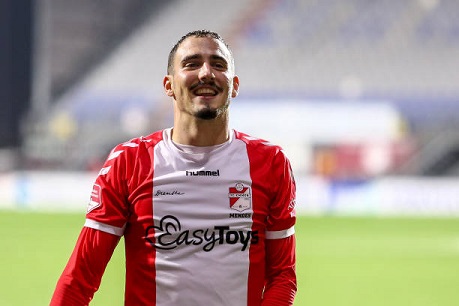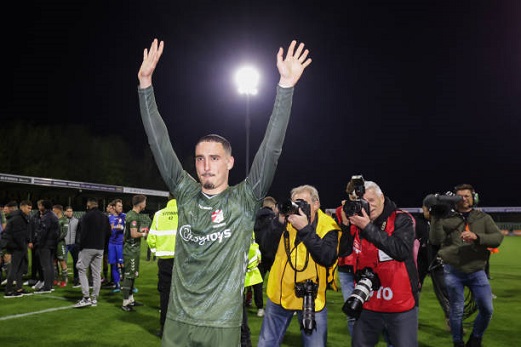 Rui Mendes is a name which has featured regularly in our Portuguese Abroad goals round-ups this season, but it would be fair to suggest that few are familiar with the forward in the nation of his birth, let alone on the wider football landscape.
Rui Mendes is a name which has featured regularly in our Portuguese Abroad goals round-ups this season, but it would be fair to suggest that few are familiar with the forward in the nation of his birth, let alone on the wider football landscape.
Earlier this month, Dutch side Emmen secured promotion from the second tier back to the Eredivisie. Mendes – his team’s leading goalscorer – has been pivotal in the Drenthe outfit pulling away at the top of the Eerste Divisie, marking a dream season for the Germain-raised forward who only arrived last summer after a successful trial period.
Originally from the parish of Gondar in Amarante, Mendes is an increasingly common story in football of a Portuguese who has made his journey in football having emigrated in childhood. The small German town of Dissen in Lower Saxony was the destination for his parents, with Mendes joined by a brother and some extended family in the western part of the country.
“When I was seven, my parents decided – and I can only thank them – to emigrate in search of a better life for them and for me and my brother,” Mendes told Maisfutebol. “The early times were tough. I cried a lot because I didn’t understand anything people were saying and asked myself many times why I was there. But I had a cousin who was around my age who helped me translate and after about six months I spoke German well.”
Within a year or two, Mendes’ love of football had grown, and he was spotted playing locally. “One day I was playing on a field next to my house and a man came to me and asked if I had a club,” he recalls. “My father went home to get some boots and shin pads, I participated in a game and scored two goals. That's how I started, when I was eight or nine years old.”
Mendes was ultimately recruited by Arminia Bielefeld, the current Bundesliga club located just half an hour’s drive from his hometown. During his time with Die Arminen, Mendes ventured into adulthood and experienced the highs and lows so common for a footballer hoping to break into the professional game.
“They told me they wanted me for the summer. I was there for three years. I always played and I scored a lot of goals. I was at the top level in the juniors [U19] and they told me that they were going to give me a professional contract and I could stay.
“I was very happy and I even went with my agent to the office of the president of Bielefeld, but in the end they gave the contract to another teammate of mine and I ended up not staying. I was without a club and that was the first time I was…,” he remembers, unable to finish the sentence.
Nagelsmann impact
The disappointment was short-lived, as an offer would soon arrive from top-flight club Hoffenheim, who signed Mendes, then 18, on a two-year deal and placed him in their B team. Although not part of the first team, the youngster was regularly drafted in train with the senior players under Julian Nagelsmann, who was making waves as one of the brightest young coaches in European football.
“I can say that he was an incredible coach,” says Mendes. “The ideas he had in training and exercises were constantly attacking and he always had a plan to attack the opposing goal. The idea was to stifle the opponent as soon as we lost the ball so that the path to the opposite goal would not be so long. And he managed to raise many players: Joelinton, who is now at Newcastle, Nico Schulz, who went to Dortmund, and others. Hoffenheim made many millions because of him.”
“In my first training session with the first team, I remember his reaction when he heard my name: Wow, with that name if you don’t play professional... I don’t know.”
Ultimately Mendes left Hoffenheim after three years with the club on a free transfer. His agent, who had worked as Mendes’ coach earlier in his career, had for months been negotiating a possible deal with Emmen, located just across the Dutch border, who were battling to stay in the Eredivisie. The team suffered relegation, but while the opportunity for Mendes remained, he would have to face a trial period in the Netherlands.
The trial largely centred around a pre-season match with top-flight club Hercules. Mendes had a dream showing, scoring a superb volley [see here] and adding a second to earn his contract. “After that game, the president came running to me and told me right away that he was going to give me a contract. It was cool. I thought maybe I could play some minutes [during the season] and help the team. I did not think I would play so much.”
 The first half of the campaign went well for Mendes, highlighted by a hat-trick in Emmen’s 7-1 win over MVV (“I think it was the best game of my career so far, I’ll never forget that game"), but it has been during the business end of the season that the Portuguese has shone, despite mid-season doubts. “We didn't score many goals and three forwards arrived on the team [in the winter window] so I thought, ’Now it's going to be complicated’," he recalls.
The first half of the campaign went well for Mendes, highlighted by a hat-trick in Emmen’s 7-1 win over MVV (“I think it was the best game of my career so far, I’ll never forget that game"), but it has been during the business end of the season that the Portuguese has shone, despite mid-season doubts. “We didn't score many goals and three forwards arrived on the team [in the winter window] so I thought, ’Now it's going to be complicated’," he recalls.
End-of-season hot streak
Instead, wearing the no7 shirt, Mendes almost equalled a club record of scoring in consecutive games, notching in eight matches in a row in March and April, including the winner in a 1-0 victory at Dordrecht to clinch promotion. The following match, in which Roda JC were beaten 2-0, saw Mendes’ run come to an end just one goal shy of matching Paul Weerman’s club record.
“Do I feel empty? Honestly, yes,” he said when asked for his reaction “I was happy, of course, because the team won, but I was used to scoring. But anyway, I knew that this day would come, and I’d rather make five assists than score a goal.”
Next season represents the biggest step in Mendes’ career. Having proved himself at professional level, the chance to test his talent against the best teams in the Netherlands offers a new challenge. So, for those who might follow his development, Mendes was asked to describe himself as a player and spoke of his mental development.
“The truth is that there aren’t many players who have my speed and who can do deep runs like me. And that allows me to create opportunities. Sometimes you need to run without the ball and I’m more of that type of player than the one who runs with the ball at his feet.
“I play on the right flank, but I also look to come into central areas a lot. I’m not much for dribbling, like a typical winger, but I’m fast and I’m looking for my way to the goal a lot, but I also really like to make assists. Perhaps I could resemble Diogo Jota, who also doesn’t do so many dribbles and looks to find space.
“[When I’ve been on the bench] I never stopped giving 100 percent in training and feeling that I had the coach’s confidence. And it did give me motivation.
“I learned to free myself mentally. When we go five or six games without scoring, we start to think about it too much and it ends up being harmful. What I did was stop thinking about it. I started to enter the field without thinking that I had to score. No pressure.
“Even before the game, now I try not to think about the game so much. I try to relax and listen to a type of music that makes me distract myself a little.”
Ajax, PSV and Feyenoord beware…
By Sean Gillen

